
Related
John Edwards blasted Dick Cheney’s voting record as a congressman where he voted against the release of Nelson Mandela, instituting a holiday for Martin Luther King, Jr., Head Start and more. We speak with John Nichols of The Nation magazine and author of Dick: The Man Who Is President. [includes rush transcript]
- Vice Presidential debate, October 5, 2004.
- John Nichols, of The Nation Magazine. His new book is called Dick: The Man Who is President.
Transcript
AMY GOODMAN: Let’s go to the rest of the record. Dick Cheney. I have to say, reading your book, John Nichols, I felt there was someone else reading it, and it was John Edwards on this issue of Cheney’s record.
JOHN EDWARDS: The Vice President, I’m surprised to hear him talk about records when he was one of 435 members of the United States House, weighs one of ten to vote against head start. He was one of four to vote against banning plastic weapons that can pass through metal detectors. He voted against the Department of Education. He voted against funding for Meals on Wheels for seniors. He voted against a holiday for Martin Luther King. He voted against a resolution calling for the release of Nelson Mandela in South Africa. It’s amazing to hear him criticize either my record or John Kerry’s.
AMY GOODMAN: John Nichols.
JOHN NICHOLS: You’re right. There’s a chapter in the book, it’s actually entitled “Apartheid’s Congressman.” It’s about Cheney’s service in the house from 1979 to 1989. One of the things that is done in that chapter is a list of the dozens and dozens of votes on which Cheney was one of less than ten members of the house putting him at the extreme edge in voting for very right-wing, very bizarre positions. And I was very delighted about this — I was delighted to hear finally in a national political debate someone bring up that Mandela vote. I have talked to Nelson Mandela about these issues. He’s very blunt about it he says one of the many reasons why he fears Dick Cheney’s power in the United states, and Mandela does say, he understands that Cheney is effectively the President of the United States, he says, one of the many reasons that he fears Dick Cheney’s power is that in the late 1980’s when even prominent republicans like Jack Kemp and Newt Gingrich were acknowledging the crime of Apartheid, Dick Cheney maintained the lie that the ANC was a terrorist organization and a fantasy that Nelson Mandela was a terrorist leader who deserved to be in jail. Frankly it begs very powerful question. If Dick Cheney’s judgment was that bad in the late 1980’s, why would we believe that it’s gotten any better in the early 21st century?
AMY GOODMAN: What about John Edwards’ record. Cheney pointedly referred to his lack of experience, and said that he had not seen him in the Senate; in fact, this is the first time they had personally met, even though Cheney says he goes there every Tuesday. After the debate, Cheney was reminded by Edward’s wife, Elizabeth, that he met her husband at a Senate prayer breakfast in 2001. Democrats said that the two men met when Elizabeth Dole was sworn in as senator of South Carolina. There’s a picture of them together at the prayer breakfast, your response to the issue of John Edwards and what his record has been or hasn’t been.
JOHN NICHOLS: Well, I mean, that was one of the classic Dick Cheney lies, by the way. He is unbelievably willing to just flat-out say something that’s not true. He knew he had met Edwards. Turns out they’re even more than just the examples that you have cited. They have been in the same room, many, many times. One of the things that Patrick Leahy pointed out after the debate was upon is that when Cheney comes to Capitol Hill, he doesn’t come to meet with the full Senate. He comes to meet in a closed, quiet, Republican Caucus to give them their instructions for the week. He created a fantasy that he’s doing a bipartisan something. It doesn’t happen. The truth is that John Edwards has only served in the Senate for six years. That’s not a lot of experience. I think you saw on something like the El Salvador question a situation where it would have been more useful if he had more experience. One thing that must be remembered is that in 2000, when George W. Bush was running for President of the United States, he also had only six years’ experience in elective office, and the elective office he held was the weakest governorship in the United States, as opposed to a seat in the US Senate that actually does deal with foreign policy, intelligence and a lot of the other matters that a President might deal with.
AMY GOODMAN: Rahul Mahajan, we have only 30 seconds, but the issue of Israel and Palestine was raised, Cheney talking about a two-state solution and Edwards addressing it as well.
RAHUL MAHAJAN: Yes, Edwards outdid Cheney on this one. To him, there are no Palestinian people, only suicide bombers who kill Israeli children, nothing about a Palestinian State, the constant military attacks and invasions, the closures, the deterioration, the humanitarian conditions. To Edwards in this debate, the Palestinian people did not exist.
AMY GOODMAN: And to Cheney?
RAHUL MAHAJAN: To Cheney, there was the per functionary mention of a state, but its part of a process where we all understand what’s being done is another attempt to create a puppet government just like in Afghanistan and in Iraq.
AMY GOODMAN: Rahul Mahajan, his book is Full Spectrum Dominance: U.S. Power in Iraq and Beyond. John Nichols’s Dick: The Man Who is President, and Robert Parry’s Secrecy and Privilege: Rise of the Bush Dynasty from Watergate to Iraq. I’m Amy Goodman, thanks for joining us.

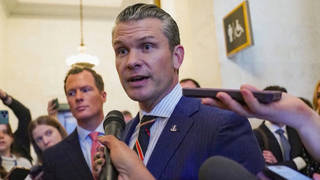
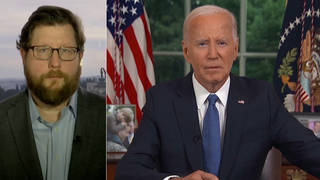
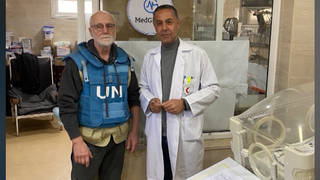
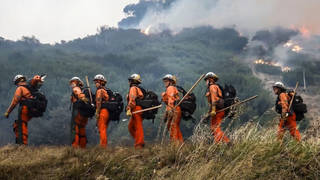






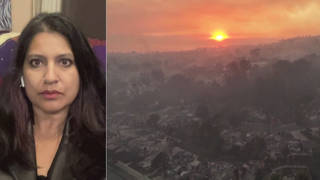
Media Options